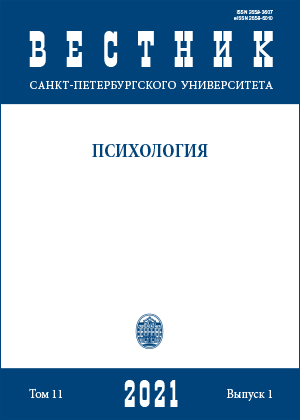“Life space” in the context of psychology of everyday life: To the 130th anniversary of Kurt Lewin
DOI:
https://doi.org/10.21638/spbu16.2021.101Abstract
The psychology of everyday life is one of the actively developing areas of modern Russian psychology. The leading theoretical and methodological sources of its development are history, anthropology and sociology of everyday life at the general scientific level of knowledge. Sources at the specific scientific level are the psychopathology of everyday life by Sigmund Freud, the field theory of Kurt Lewin, and the psychological concept of Hans Thomae. The demand for the ideas of Lewin is determined today by transformations of modernity, bringing to the fore the issues of socio-cultural dynamics and polymotivation of an individual, the clash of values and the subject’s conscious choice of a life path, formation of identity in changing life situations, and diversity of lifestyles in a complicated society. Everyday life is multi-layered, variegated, and heterogeneous. It presents the dynamics of the visible and invisible, real and surreal, modern and archaic. To detect gradual and imperceptible changes, it is often necessary to change the methodological toolkit. Lewin’s construct of “life space” in the context of the psychology of everyday life allows one to configure various aspects of human development in a situation of sociocultural transformations where social space can be both supportive and suppressive, and the spheres of private and public, personal and professional, mix. This results in a loss of normative boundaries. Cultural-psychological time in a common geographic space flows differently for people and communities, which not only creates risks of potential conflicts by drawing fault lines in the social fabric, but also poses the problem of a description language capable of combining nomothetic (revealing trends and patterns) and idiographic (directed analysis of unique cases) discourses. Lewin solved similar methodological and socio-political problems. It seems that his approach is very productive for the diagnosis and treatment of cultural and psychological trauma in Russian society. In the article, it is emphasized that the strategy of Lewin’s “action research” is close to the social constructivism of the Russian intellectual tradition, which makes it possible to comprehend the work of a psychologist as a solution to the problems of humanizing society and the education system.
Keywords:
life space, psychology of everyday life, subject, transformations of modernity, methodology
Downloads
References
References
Kostromina S. N. (eds). Life Space in Psychology: Theory and Phenomenology. St. Petersburg, St. Petersburg State University Press, 2020, pp. 124–148. (In Russian)
Downloads
Published
How to Cite
Issue
Section
License
Articles of "Vestnik of Saint Petersburg University. Psychology" are open access distributed under the terms of the License Agreement with Saint Petersburg State University, which permits to the authors unrestricted distribution and self-archiving free of charge.




